Korea by Bike
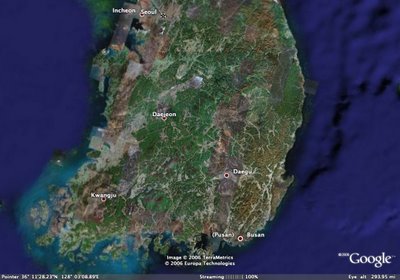
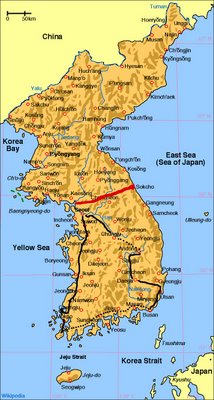 The route I took. The dots show where I took a bus, the first time to avoid a mountain range, the second one, from Pusan to Jindo, was because I spent too long playing in Andong and Fukuoka, so I needed to skip some part.
The route I took. The dots show where I took a bus, the first time to avoid a mountain range, the second one, from Pusan to Jindo, was because I spent too long playing in Andong and Fukuoka, so I needed to skip some part. 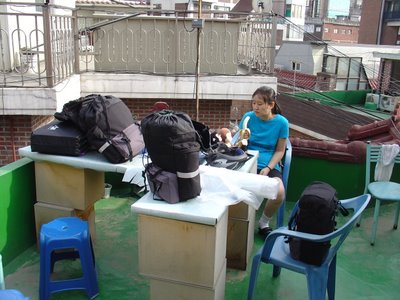 Trying to get the bags packed and organized.
Trying to get the bags packed and organized.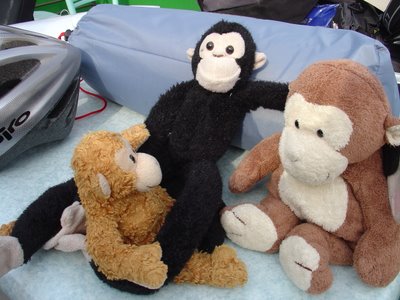 Umberto says goodbye to Taro and Lulu.
Umberto says goodbye to Taro and Lulu. An overloaded bike and an overweight Alec getting a late star. About 25 percent of the baggage and 3 percent of the weight would be tossed or lost in the next four weeks. Across the Han River you can see the golden 63 building, Korea's tallest.
An overloaded bike and an overweight Alec getting a late star. About 25 percent of the baggage and 3 percent of the weight would be tossed or lost in the next four weeks. Across the Han River you can see the golden 63 building, Korea's tallest.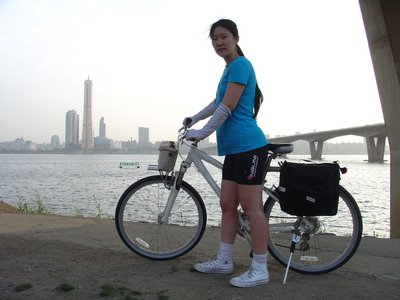 Shinhye road with me along the river until the evening.
Shinhye road with me along the river until the evening.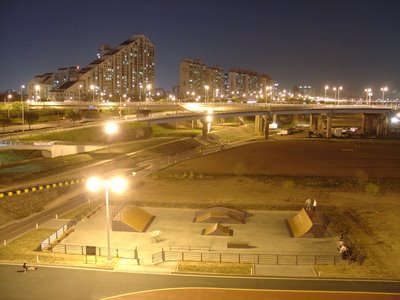 A skate park on the edge of Seoul. I got a late start, and Seoul is so big that riding along the river trying to get out of the city takes hours. I was determined to get as far out as I could, so I rode until nearly midnight.
A skate park on the edge of Seoul. I got a late start, and Seoul is so big that riding along the river trying to get out of the city takes hours. I was determined to get as far out as I could, so I rode until nearly midnight. 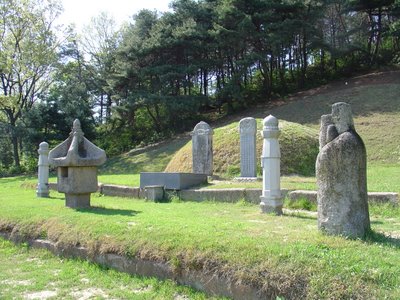 The second day, only a few minutes out of Seoul's built-up suburbs, I saw this 13th century beurocract's tomb. I thought I was lucky to stumble on it, and spent an hour there walking around and resting.
The second day, only a few minutes out of Seoul's built-up suburbs, I saw this 13th century beurocract's tomb. I thought I was lucky to stumble on it, and spent an hour there walking around and resting. 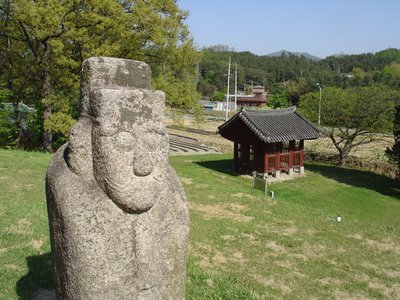 The view from the tomb. You can see the bike leaning on the building (click on the image to make larger).
The view from the tomb. You can see the bike leaning on the building (click on the image to make larger).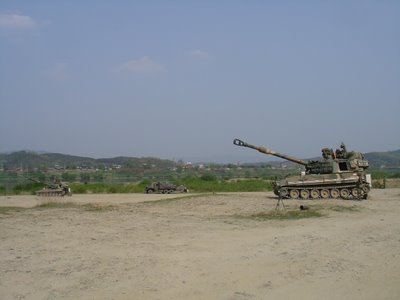 Just 50 or so miles south of the border, the Han River makes a natural defense against another fratricidal war. I road along the river for a couple of days, and their were army exercises everywhere. As I walked through these tanks, I overheard the soldiers, who were too shy to stop me from taking pictures themselves, saying to call the interpreter. I pretended, of course, I didn't understand what they were saying to each other, and kept taking pictures. The interpreter eventually came running over, carrying his machine gun and sweating, and said "Please, Sir, no pictures." I said "아, 알겠습니다. 죄송해요." He realized he'd been had, hung his head and walked back to his tent while his friends on the tank laughed at him.
Just 50 or so miles south of the border, the Han River makes a natural defense against another fratricidal war. I road along the river for a couple of days, and their were army exercises everywhere. As I walked through these tanks, I overheard the soldiers, who were too shy to stop me from taking pictures themselves, saying to call the interpreter. I pretended, of course, I didn't understand what they were saying to each other, and kept taking pictures. The interpreter eventually came running over, carrying his machine gun and sweating, and said "Please, Sir, no pictures." I said "아, 알겠습니다. 죄송해요." He realized he'd been had, hung his head and walked back to his tent while his friends on the tank laughed at him. 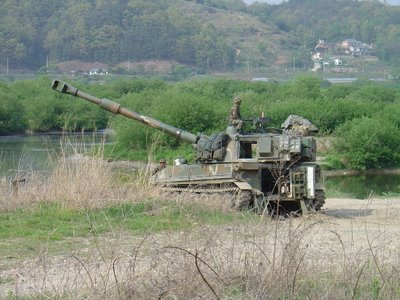 Tank.
Tank.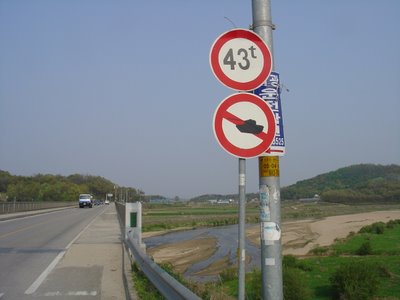 There are so many military exercises along the river they need to put up signs like this.
There are so many military exercises along the river they need to put up signs like this.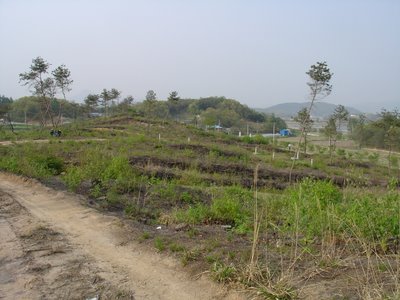 I guessed the geomancy or feng shui along the Han River must be good for burying your ancestors, because the tombs were everywhere. Or I guessed visiting your ancestors was easier if you buried them near Seoul. But as it turns out they're everywhere all over the peninsula. I'd see new ones every few minutes on almost every road, and if you were to travel by car the Korean scenery must look like a big blur of mountains and tombs. (On a bike, the mountains do not blur by. More like drone). They make for good if spooky camping spots though.
I guessed the geomancy or feng shui along the Han River must be good for burying your ancestors, because the tombs were everywhere. Or I guessed visiting your ancestors was easier if you buried them near Seoul. But as it turns out they're everywhere all over the peninsula. I'd see new ones every few minutes on almost every road, and if you were to travel by car the Korean scenery must look like a big blur of mountains and tombs. (On a bike, the mountains do not blur by. More like drone). They make for good if spooky camping spots though. 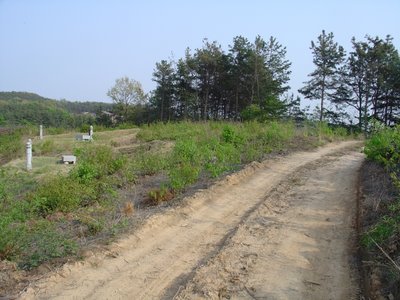 If you're a god son or daughter, there are a couple of holidays a year where you bring the family out to the plot. There were dozens of little tombs at this one spot, a couple hundred meters up from the road.
If you're a god son or daughter, there are a couple of holidays a year where you bring the family out to the plot. There were dozens of little tombs at this one spot, a couple hundred meters up from the road.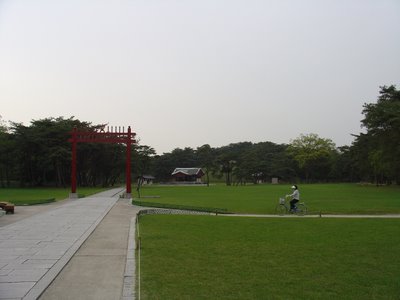 In a nice bit of luck I spotted a sign for the tomb of Sejong the Great, Korea's greatest king, the King James to Korea's writing system, which is, they tell me, the only planned writing system and the world's most logical. It was meant to replace the difficult and undemocratic Chinese characters (only the educated had the thousands of hours to learn to read) and it succeeded: you can learn to read it in a few hours. It really is a fantastic system, and Korea has a national holiday for the writing system, like Americans have "flag day" or Fourth of July. / It's a pleasant park with a crap museum.
In a nice bit of luck I spotted a sign for the tomb of Sejong the Great, Korea's greatest king, the King James to Korea's writing system, which is, they tell me, the only planned writing system and the world's most logical. It was meant to replace the difficult and undemocratic Chinese characters (only the educated had the thousands of hours to learn to read) and it succeeded: you can learn to read it in a few hours. It really is a fantastic system, and Korea has a national holiday for the writing system, like Americans have "flag day" or Fourth of July. / It's a pleasant park with a crap museum. 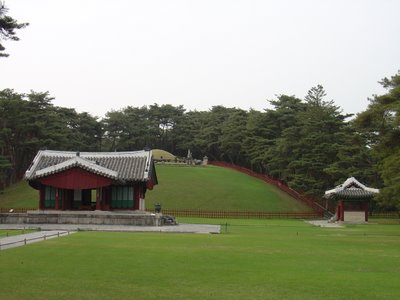
That's Seojong's little mound of dirt on the hill, no bigger than your great grandfathers. Sure is more tasteful than the Washington monument. 
In May they smoke the rice fields to keep the bugs off. This ajuma (middle aged married woman) was really sweet, Where are you going? That's too far! You'll never make it; you have to many bags!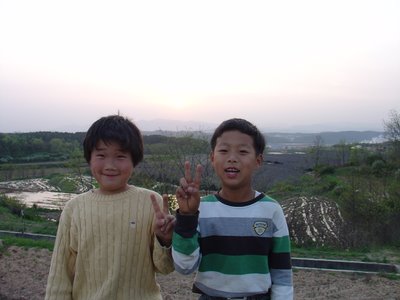 I stopped to talk to these two little guys near a bus stop, waiting to go home from the town with their school. It was dusk, and they'd been playing all afternoon. I mentioned I was lost, and Sung-ooh, the one on the left, said if I followed him to his village, which takes an hour and a half from here, he'd show me the road. "But I have a bike, you're walking." "That's OK, I can run beside you," which is just what he did, all the way home. / Along the way he told me about his school, his teacher ("Who is not married and I can introduce you...") and how he sometimes walks all the way home from school. Sung-ooh says the whole country side is full of ghosts who come out after dusk, so he tries to get home before then. His mom ran off a few years ago. He's never heard from her, and doesn't like her. His dad is really cool though. Many, many people in his village have died of cancer (I have no idea what that meant, but I think it was probably like two).
I stopped to talk to these two little guys near a bus stop, waiting to go home from the town with their school. It was dusk, and they'd been playing all afternoon. I mentioned I was lost, and Sung-ooh, the one on the left, said if I followed him to his village, which takes an hour and a half from here, he'd show me the road. "But I have a bike, you're walking." "That's OK, I can run beside you," which is just what he did, all the way home. / Along the way he told me about his school, his teacher ("Who is not married and I can introduce you...") and how he sometimes walks all the way home from school. Sung-ooh says the whole country side is full of ghosts who come out after dusk, so he tries to get home before then. His mom ran off a few years ago. He's never heard from her, and doesn't like her. His dad is really cool though. Many, many people in his village have died of cancer (I have no idea what that meant, but I think it was probably like two).  It was dark when we got there; this was with a flash. That's his little brother and gorgeous sister. I bought him some OJ. / If you want to be an English pen-pal, and inspire any of them to study hard and get off the farm, I've got their address.
It was dark when we got there; this was with a flash. That's his little brother and gorgeous sister. I bought him some OJ. / If you want to be an English pen-pal, and inspire any of them to study hard and get off the farm, I've got their address.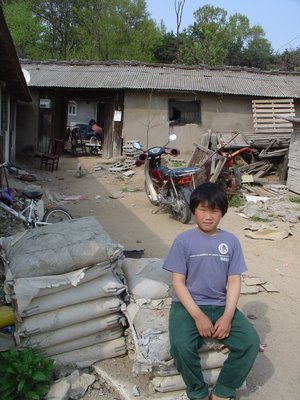 The next day I spent a few hour trying to find a shop that could fix a problem with my gears. When I was done it was to late to start off again, so I backtracked to Sung-ooh's village to see if he was around. He'd come home early that day. That's his dad in the background, and he didn't look so cool to me; he wouldn't say hi.
The next day I spent a few hour trying to find a shop that could fix a problem with my gears. When I was done it was to late to start off again, so I backtracked to Sung-ooh's village to see if he was around. He'd come home early that day. That's his dad in the background, and he didn't look so cool to me; he wouldn't say hi.  I bought a beer at the little shop, and drank it by some tombs in Sung-ooh's village.
I bought a beer at the little shop, and drank it by some tombs in Sung-ooh's village. 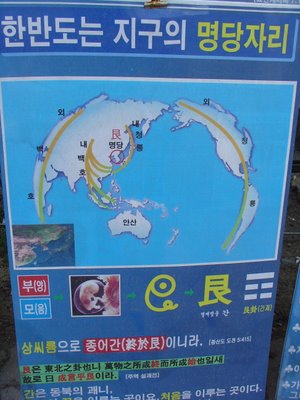 This is a poster for some weird nationalistic cult - there was a whole display and a convert happily passing out pamphlets. The poster says "The Korean peninsula is the center of the world's feng-shui!". The peninsula is also shaped like a fetus, whatever that means. They also incorporate Buddah and Jesus, among others.
This is a poster for some weird nationalistic cult - there was a whole display and a convert happily passing out pamphlets. The poster says "The Korean peninsula is the center of the world's feng-shui!". The peninsula is also shaped like a fetus, whatever that means. They also incorporate Buddah and Jesus, among others. 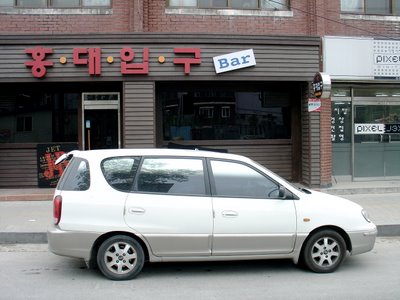 A bar in Yeo-ju, "Hongdae University Bar", named after my neighborhood in Seoul. Tell them you're from Hongdae, you get the free whiskey. Nice.
A bar in Yeo-ju, "Hongdae University Bar", named after my neighborhood in Seoul. Tell them you're from Hongdae, you get the free whiskey. Nice. 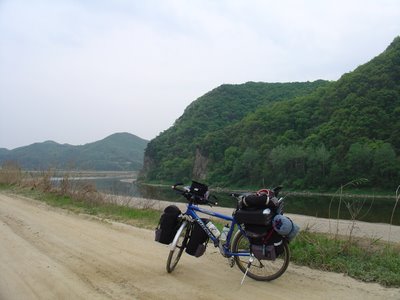 Trying to out stay in front of the rain along a beautiful river.
Trying to out stay in front of the rain along a beautiful river. 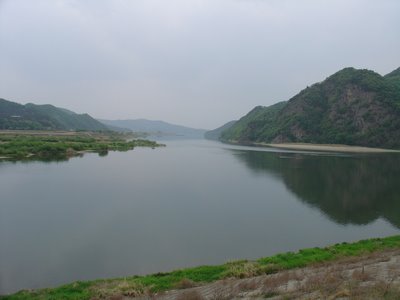 I got lost here, but it was OK.
I got lost here, but it was OK.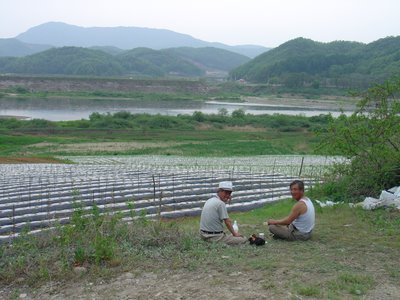 These guys invited me for a post-farming bottle of rice wine. When I asked about the rain they said "Soon," so I had to turn them down.
These guys invited me for a post-farming bottle of rice wine. When I asked about the rain they said "Soon," so I had to turn them down. 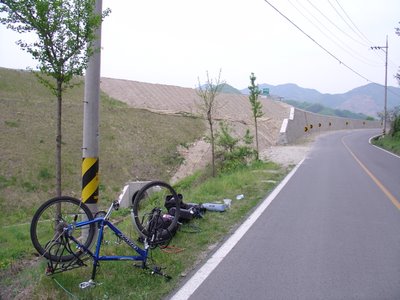 Only to get my first (and only) flat. I hadn't changed one since I was 12. It sucked.
Only to get my first (and only) flat. I hadn't changed one since I was 12. It sucked. 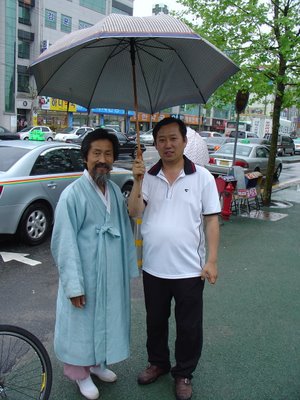 Chungju. This guy is a far-left member of the Korean Assembly, maybe the only member who dresses traditionally (the left, unlike the States, is often really nationalistic in Korea). He's often gets in fisticuffs in the Assembly, over the FTA or rice tariffs or whatnot. But I was pretty disappointed in his politician's moves (phony smile, business card) and that, as a friend of the working class, he needed this dude to carry his umbrella.
Chungju. This guy is a far-left member of the Korean Assembly, maybe the only member who dresses traditionally (the left, unlike the States, is often really nationalistic in Korea). He's often gets in fisticuffs in the Assembly, over the FTA or rice tariffs or whatnot. But I was pretty disappointed in his politician's moves (phony smile, business card) and that, as a friend of the working class, he needed this dude to carry his umbrella. 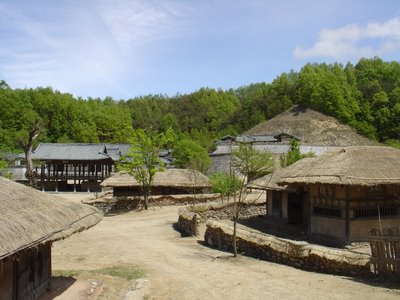 A reusable mini-series set. It's actually really authentic, more than the government funded, working traditional villages around the country.
A reusable mini-series set. It's actually really authentic, more than the government funded, working traditional villages around the country. 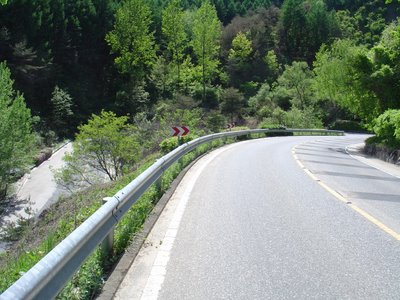 Korea is incredibly mountainous, or big hilly. The great majority of my trip was up plodding up a big hill, an exciting trip down the other side, five minutes of flat, and then repeat the whole thing. I was fairly in shape when I started, from riding an hour or two a day for a few months in preparation, but the first week of the trip was a struggle. Later the hills just were just annoying: boring, tiring, and they took a long time to get to the top of. Good music helped.
Korea is incredibly mountainous, or big hilly. The great majority of my trip was up plodding up a big hill, an exciting trip down the other side, five minutes of flat, and then repeat the whole thing. I was fairly in shape when I started, from riding an hour or two a day for a few months in preparation, but the first week of the trip was a struggle. Later the hills just were just annoying: boring, tiring, and they took a long time to get to the top of. Good music helped.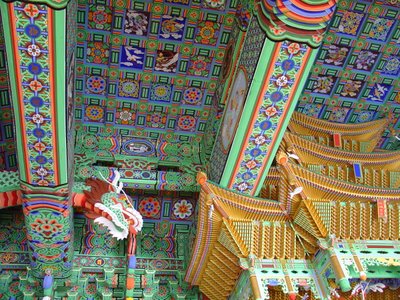 I stopped at a little Temple. A bewildered monk peeked out a window at me, frowned, and closed the window. I went and walked around temple and the grounds, which were laid out really attractively.
I stopped at a little Temple. A bewildered monk peeked out a window at me, frowned, and closed the window. I went and walked around temple and the grounds, which were laid out really attractively.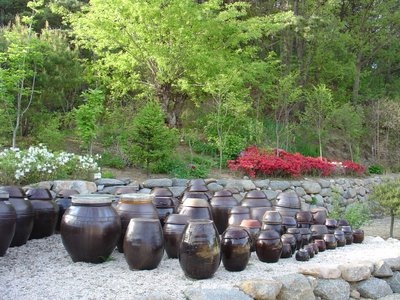 Even the kimchi pots were little rows. (You ferment and store kimchi stuff in them, sometimes buried in the ground, the whole winter. But about six years ago someone invented with kimchi refrigerators, so goodbye cute custom.)
Even the kimchi pots were little rows. (You ferment and store kimchi stuff in them, sometimes buried in the ground, the whole winter. But about six years ago someone invented with kimchi refrigerators, so goodbye cute custom.)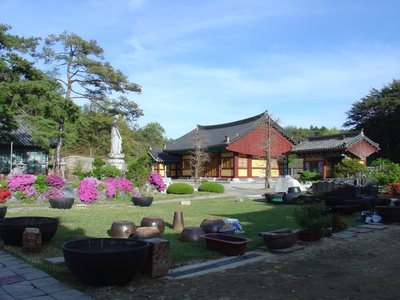 After a half hour a car pulled up full of monks. Female monks - I hadn't noticed that the one in the window was a woman. We talked for awhile, and, when they asked me where I was staying, I said "My tent somewhere." They'd never had a foreigner come to the temple before, and a man to boot, but they invited me to stay, but warned me I'd have to get up at 3:30 for prayers.
After a half hour a car pulled up full of monks. Female monks - I hadn't noticed that the one in the window was a woman. We talked for awhile, and, when they asked me where I was staying, I said "My tent somewhere." They'd never had a foreigner come to the temple before, and a man to boot, but they invited me to stay, but warned me I'd have to get up at 3:30 for prayers. 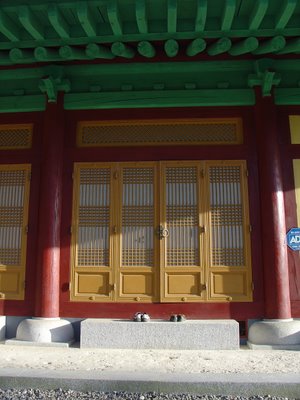 Two monks were staying in here, doing some serious unknown meditation or prayers, for most of the day, and for weeks at a time.
Two monks were staying in here, doing some serious unknown meditation or prayers, for most of the day, and for weeks at a time. 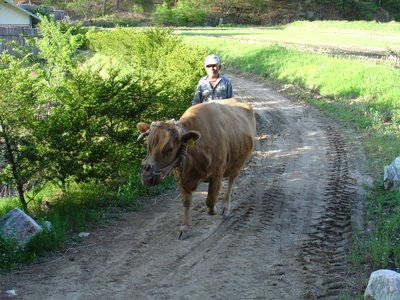 Just farms around the temple.
Just farms around the temple. 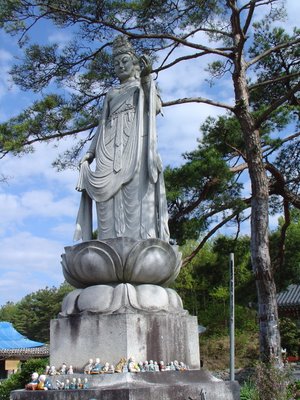 Say a prayer and leave a little Buddha statue at the base (click to make it bigger).
Say a prayer and leave a little Buddha statue at the base (click to make it bigger). 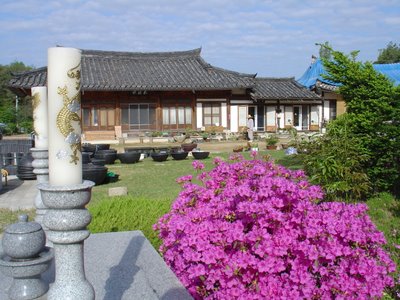 They wouldn't let me take their pictures, which was too bad because they were kind, adorable, and I would've like to remember their faces. Oh well, I guess life is suffering. I shot this from the hip, the only shot with a body in it, and it turned out pretty nicely. / The food, dinner and breakfast, was fantastic. I had traditional tea with two of the monks after dinner, which was second only to waking up at three to the sound of one monk walking the grounds chanting and beating whole notes on a drum. I sat outside and watched her slowly walk around the grounds. The praying, in the temple, involves cow-towing over and over. I don't know how long they go for, but my legs - pretty strong from riding the bike - quit after 40 minutes, but the monks had told me to stop whenever. Breakfast and time to ride to Andong:
They wouldn't let me take their pictures, which was too bad because they were kind, adorable, and I would've like to remember their faces. Oh well, I guess life is suffering. I shot this from the hip, the only shot with a body in it, and it turned out pretty nicely. / The food, dinner and breakfast, was fantastic. I had traditional tea with two of the monks after dinner, which was second only to waking up at three to the sound of one monk walking the grounds chanting and beating whole notes on a drum. I sat outside and watched her slowly walk around the grounds. The praying, in the temple, involves cow-towing over and over. I don't know how long they go for, but my legs - pretty strong from riding the bike - quit after 40 minutes, but the monks had told me to stop whenever. Breakfast and time to ride to Andong: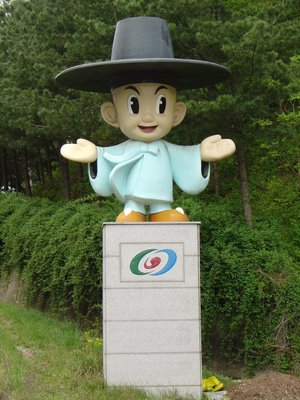 This is Andong man, mascot of Andong!
This is Andong man, mascot of Andong! 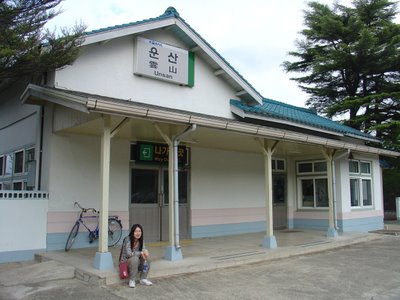 When Shin-hye was young, her father, a pastor, started a small congregation for the poor, which impoverished the family (but everyone was poor in Korea then). Her parents had to send her to her grandmother's house in the country for a few years, and so as a five year old kid she had the run of a little rural village, and the mountains and streams around it. She disappeared in the morning, scrounged lunch at someone's house or a restaurant, and came back to her grandmother's home before dark. Nobody worried about her. / She met me in Andong and we took the bus to her village, Un-san. Here's the - new - train station.
When Shin-hye was young, her father, a pastor, started a small congregation for the poor, which impoverished the family (but everyone was poor in Korea then). Her parents had to send her to her grandmother's house in the country for a few years, and so as a five year old kid she had the run of a little rural village, and the mountains and streams around it. She disappeared in the morning, scrounged lunch at someone's house or a restaurant, and came back to her grandmother's home before dark. Nobody worried about her. / She met me in Andong and we took the bus to her village, Un-san. Here's the - new - train station.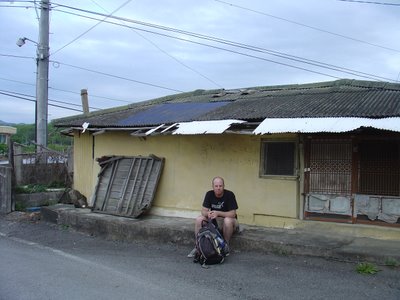 The writing on this house says "Gone to the hospital." And a phone number. The house looks like it's been deserted a long time.
The writing on this house says "Gone to the hospital." And a phone number. The house looks like it's been deserted a long time.  Shinhye's grandmother had an apple orchard - there were a few little ones around the village. These are the old boxes that the villagers used to use for apples, discarded now for cardboard.
Shinhye's grandmother had an apple orchard - there were a few little ones around the village. These are the old boxes that the villagers used to use for apples, discarded now for cardboard. 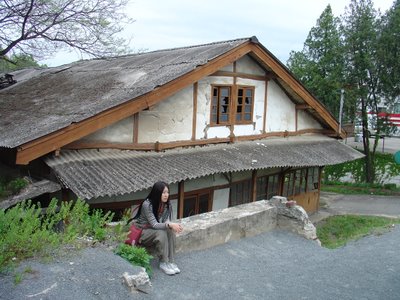 And an old soju bar. I'm surprised no one wrote "moved to the city" on the side.
And an old soju bar. I'm surprised no one wrote "moved to the city" on the side.  The Andong soju museum. The guide spoke in English, and he was excited and nervous to practice because some American general was coming the next week. The stuff they distill here is really good and has double the alcohol content. Shinhye found out the hard way.
The Andong soju museum. The guide spoke in English, and he was excited and nervous to practice because some American general was coming the next week. The stuff they distill here is really good and has double the alcohol content. Shinhye found out the hard way. 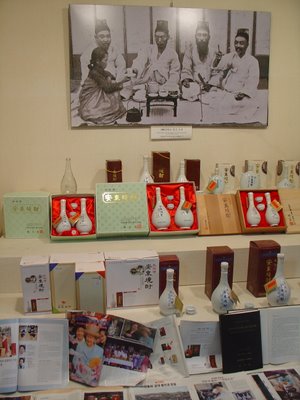 Soju.
Soju. 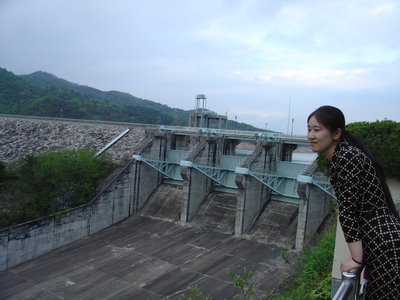 Dam.
Dam.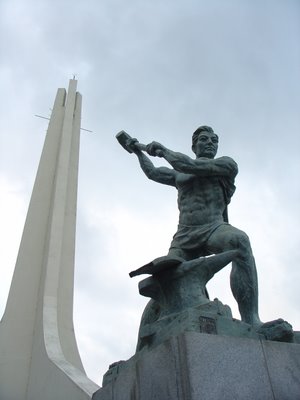 Man. I prefer Andong Man. This guy looks like North Korea Man.
Man. I prefer Andong Man. This guy looks like North Korea Man.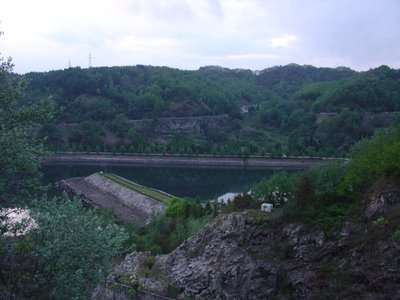 A little army pillbox, again on the south side of a river.
A little army pillbox, again on the south side of a river. 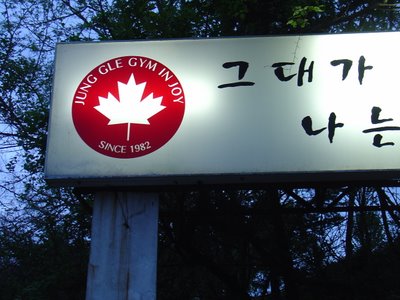 Who could resist? Not we.
Who could resist? Not we. 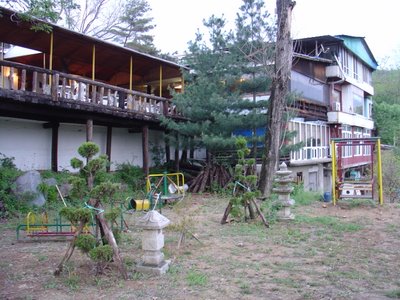 Since 1982 indeed.
Since 1982 indeed. 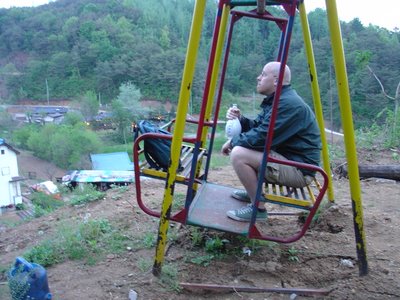 In joy the jung gle gym with a little Andong Soju.
In joy the jung gle gym with a little Andong Soju.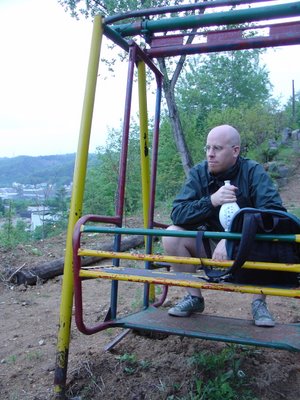
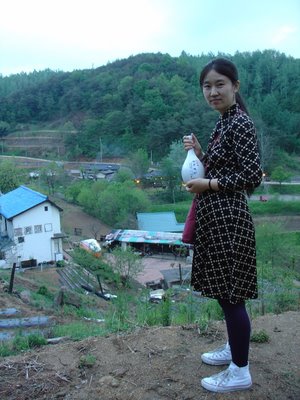
Shinhye posing.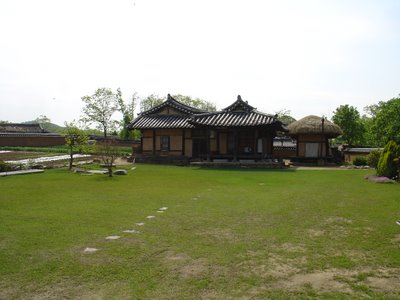 A traditional village, 하회마을, that is thought to have invented the Korean mask dance. The government subsidizes some of the villagers.
A traditional village, 하회마을, that is thought to have invented the Korean mask dance. The government subsidizes some of the villagers. 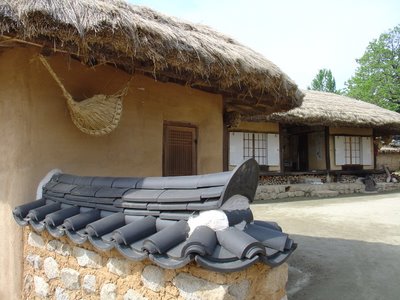 Paper doors, but the under-the-floor heating is Korea's greatest invention. Water pipes (previously just buring wood or coals under the floor) criss cross under the floor, and as hot water goes through them, the floor heats up (it can get hot enough to kill someone who's passed out drunk on it). Heat rises, so that works well, plus, most people (me too) just throw a blanket or two on the floor and sleep like that. No cold beds, and no cold feet on bathroom runs. (click on the picture and you can see where they load in the wood under the paper doors)
Paper doors, but the under-the-floor heating is Korea's greatest invention. Water pipes (previously just buring wood or coals under the floor) criss cross under the floor, and as hot water goes through them, the floor heats up (it can get hot enough to kill someone who's passed out drunk on it). Heat rises, so that works well, plus, most people (me too) just throw a blanket or two on the floor and sleep like that. No cold beds, and no cold feet on bathroom runs. (click on the picture and you can see where they load in the wood under the paper doors)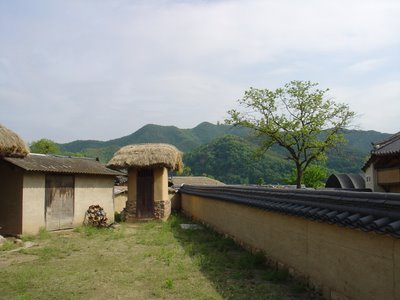 Outhouse.
Outhouse.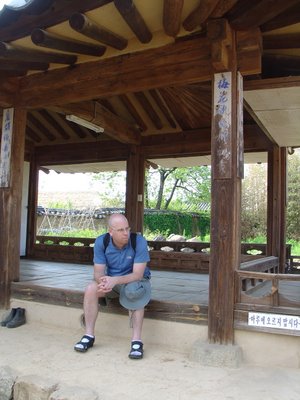
 An old aristocratic mayor (more like feudal baron) thought the village's geomancy wasn't just right, so he planted this grove of trees. Thanks, feudal baron!
An old aristocratic mayor (more like feudal baron) thought the village's geomancy wasn't just right, so he planted this grove of trees. Thanks, feudal baron!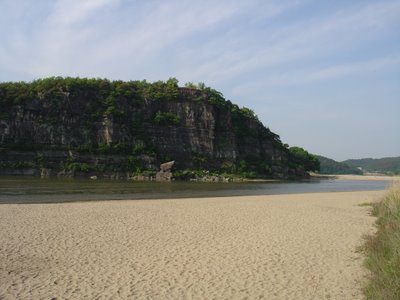 The village is on a peninsula, surrounded on three sides by a little river.
The village is on a peninsula, surrounded on three sides by a little river. 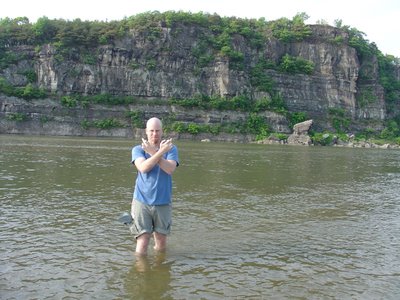
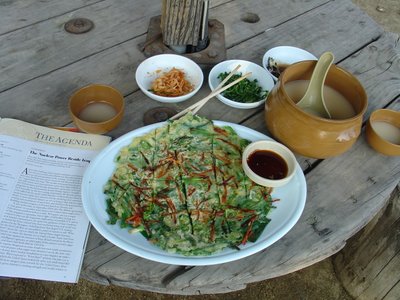 Fantastic vegetable pancake, makkoli rice wine, and the Atlantic.
Fantastic vegetable pancake, makkoli rice wine, and the Atlantic.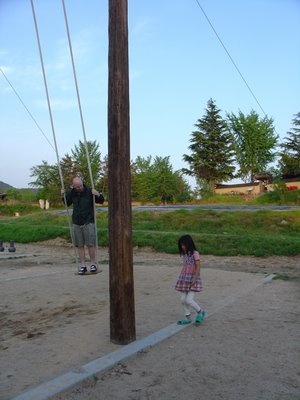 Adam and I went to this village in 1998, and we played with this little girl at the restaurant her parents own. All grown up.
Adam and I went to this village in 1998, and we played with this little girl at the restaurant her parents own. All grown up. 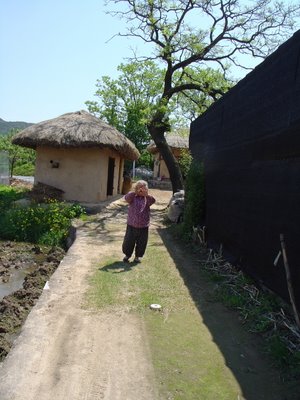 Oops. Here's the little woman who's house we stayed at in the traditional village. She hadn't had guests in forever, and scrambled around trying to find bedding and whatnot. She was really sweet, but when she saw some dress Shinhye was wearing, she said really scornfully, "Bah, that looks Japanese." Later another villager told us that the old woman can speak Japanese fluently. So we figure during the occupation she'd learned Japanese like everyone else (they made Japanese the official language, and Korean was in many cases illegal) but must've had some pretty bad experiences like everyone else. Here she won't let me take her picture. Not in a Buddhist way, like the monks, she said rather "I used to be beautiful, now I'm not."
Oops. Here's the little woman who's house we stayed at in the traditional village. She hadn't had guests in forever, and scrambled around trying to find bedding and whatnot. She was really sweet, but when she saw some dress Shinhye was wearing, she said really scornfully, "Bah, that looks Japanese." Later another villager told us that the old woman can speak Japanese fluently. So we figure during the occupation she'd learned Japanese like everyone else (they made Japanese the official language, and Korean was in many cases illegal) but must've had some pretty bad experiences like everyone else. Here she won't let me take her picture. Not in a Buddhist way, like the monks, she said rather "I used to be beautiful, now I'm not."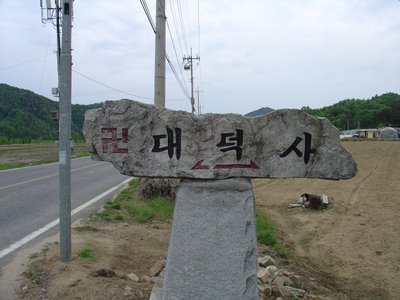 Shinhye went home, I got on my bike and saw this sign for a temple, and turned right.
Shinhye went home, I got on my bike and saw this sign for a temple, and turned right.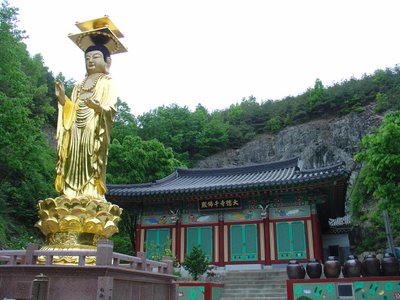 The whole complex is carved into the side of a mountain.
The whole complex is carved into the side of a mountain. 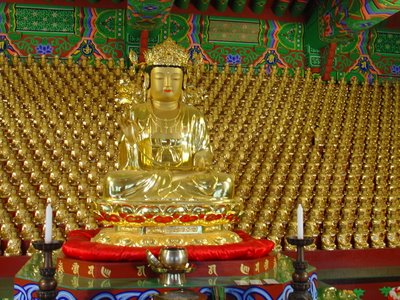 We are all individuals!
We are all individuals!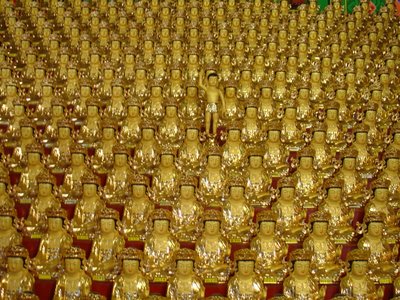 I'm not!
I'm not!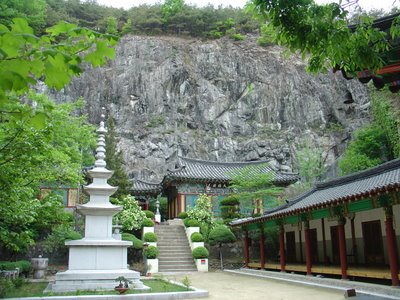 There was monk (again female) and a cook/handywoman who lived there. They invited me to dinner, but said nothing about sleeping, so I pushed on to find a place to camp.
There was monk (again female) and a cook/handywoman who lived there. They invited me to dinner, but said nothing about sleeping, so I pushed on to find a place to camp.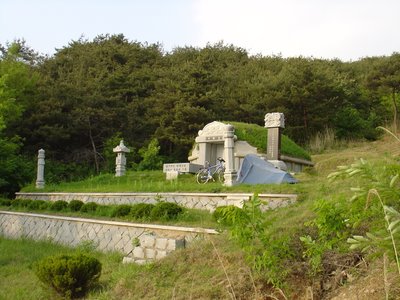 Some of the tombs, or probably most, are out of sight of the roads. Sometimes there is just a little dirt path by the highway, but if you turn off you often find on of these. Great for camping, if you don't mind the ghosts. This was the scariest night, because I heard these creepy moans off in the distance again and again. I told myself it was some kids, or drunk adults, who'd spotted my tent and were trying to give me a spook. Finally, I realized it was cows on the other side of the hill.
Some of the tombs, or probably most, are out of sight of the roads. Sometimes there is just a little dirt path by the highway, but if you turn off you often find on of these. Great for camping, if you don't mind the ghosts. This was the scariest night, because I heard these creepy moans off in the distance again and again. I told myself it was some kids, or drunk adults, who'd spotted my tent and were trying to give me a spook. Finally, I realized it was cows on the other side of the hill. 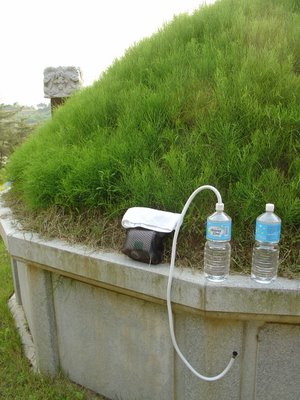 My shower invention.
My shower invention. 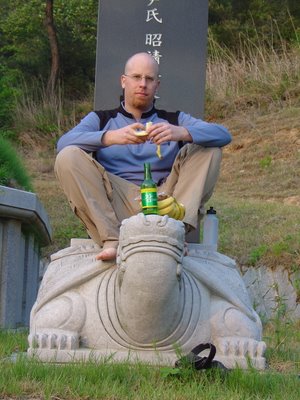 Dinner of bananas, peanuts, and soju. Sit on the turtle and watch the sun go down, wearing a Star Trek uniform.
Dinner of bananas, peanuts, and soju. Sit on the turtle and watch the sun go down, wearing a Star Trek uniform.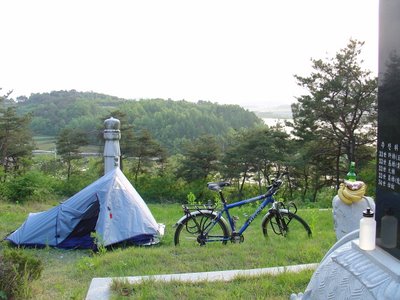 Perfect spot.
Perfect spot.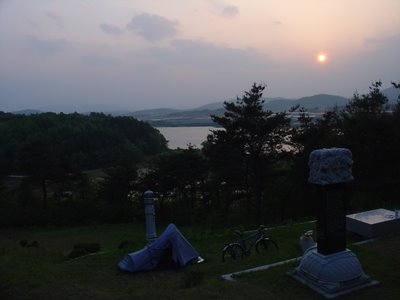 No photographer, I couldn't get a shot of how great the sunset was, and I didn't stop to enjoy it because I was taking pictures. Life is suffering.
No photographer, I couldn't get a shot of how great the sunset was, and I didn't stop to enjoy it because I was taking pictures. Life is suffering. 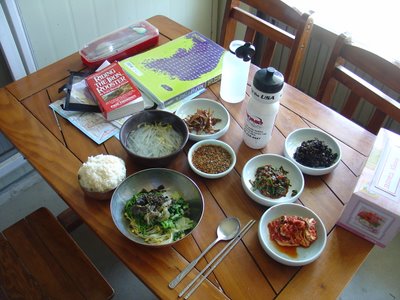 Breakfast. Food started tasting better and better after the first week, and became so exciting that I wanted to remember each meal and took pictures of it; mine, mine! Like Christmas. Especially after a dinner of bananas and peanuts. Sometimes I ate three of those bowls of rice.
Breakfast. Food started tasting better and better after the first week, and became so exciting that I wanted to remember each meal and took pictures of it; mine, mine! Like Christmas. Especially after a dinner of bananas and peanuts. Sometimes I ate three of those bowls of rice.  Outside Gyeongju. Many people over thirty or forty grew up on farms. You see these little plots near cities, and I figure you can take the farmer out of the farm...
Outside Gyeongju. Many people over thirty or forty grew up on farms. You see these little plots near cities, and I figure you can take the farmer out of the farm...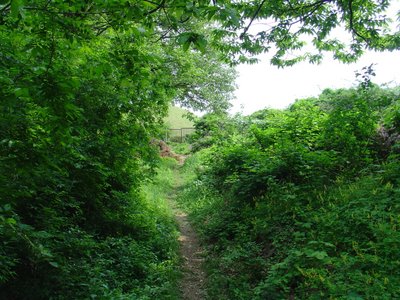 Gyeongju was an ancient capital of Korea, and there are tombs and temples everywhere, really. I saw this little path and walked up it...
Gyeongju was an ancient capital of Korea, and there are tombs and temples everywhere, really. I saw this little path and walked up it... ...opened this gate...
...opened this gate...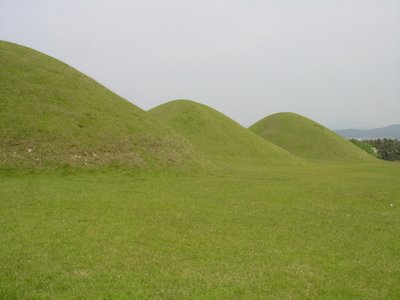 ...and found these. They're twenty or thirty feet high.
...and found these. They're twenty or thirty feet high. 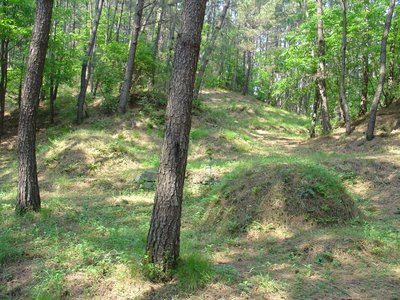 An old woman saw me taking pictures in some little village near Gyeongju. She pointed to a path up a mountain and said 가, Go, go! I went up the path fifty yards and found a little pagoda, took a picture and came back down. I said thanks, that was nice, but she said 아니, 가, 가, Goooo! She didn't want to accept that I could understand Korean, but it was obvious she wanted me to go the whole way up.
An old woman saw me taking pictures in some little village near Gyeongju. She pointed to a path up a mountain and said 가, Go, go! I went up the path fifty yards and found a little pagoda, took a picture and came back down. I said thanks, that was nice, but she said 아니, 가, 가, Goooo! She didn't want to accept that I could understand Korean, but it was obvious she wanted me to go the whole way up. 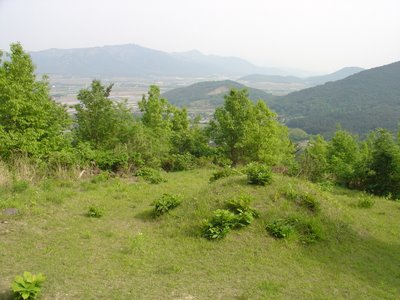 It took forty minutes to get to the top, but every ten yards on the way up there were tombs on the side of the path. All kinds: big ones, tiny ones, ancient and overgrown ones, new ones. Some were so old you almost missed them, and there must have been many that are now just impossible to notice. On the way down, I counted, intentionally not trying to look for them, 64.
It took forty minutes to get to the top, but every ten yards on the way up there were tombs on the side of the path. All kinds: big ones, tiny ones, ancient and overgrown ones, new ones. Some were so old you almost missed them, and there must have been many that are now just impossible to notice. On the way down, I counted, intentionally not trying to look for them, 64. 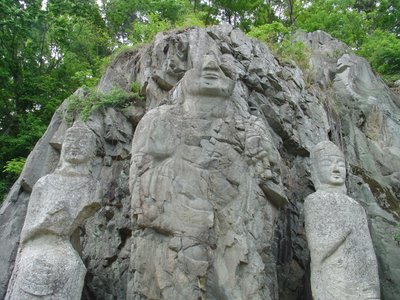 And at the top this old Buddha carved into the side of the mountain.
And at the top this old Buddha carved into the side of the mountain. 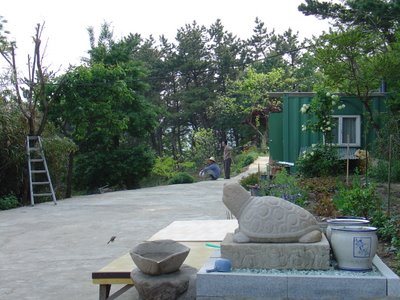 An old couple lives at the top of the mountain. " ...Nobody comes up here anymore, especially not foreigners." I have no idea how they get up and down.
An old couple lives at the top of the mountain. " ...Nobody comes up here anymore, especially not foreigners." I have no idea how they get up and down.  An hour outside of Gyeongju I looked up and saw I was surrounded by huge tombs. I later read that there is one king buried here, but they made dozens of tombs, big and small, to stop the tomb raiders.
An hour outside of Gyeongju I looked up and saw I was surrounded by huge tombs. I later read that there is one king buried here, but they made dozens of tombs, big and small, to stop the tomb raiders.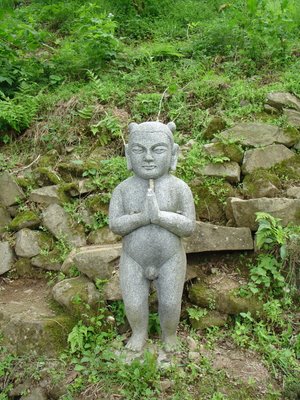 At the top of another mountain (alas, no noticeable tombs on the way up) a little guy welcomes you after a long hike - those are coins on him.
At the top of another mountain (alas, no noticeable tombs on the way up) a little guy welcomes you after a long hike - those are coins on him. 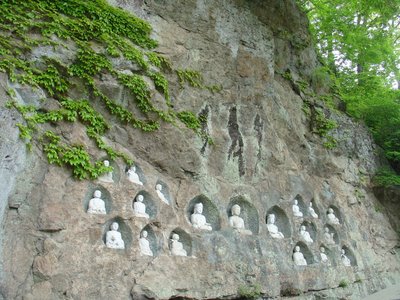 And the reward, Buddha and friends carved into the mountain.
And the reward, Buddha and friends carved into the mountain. The caretaker's huts.
The caretaker's huts. 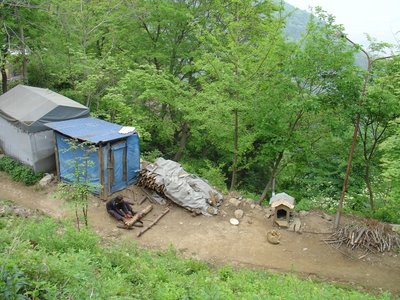 I guess he lives here all alone with his dog. He just nodded at me when I said hi, looked down, and kept sawing.
I guess he lives here all alone with his dog. He just nodded at me when I said hi, looked down, and kept sawing. 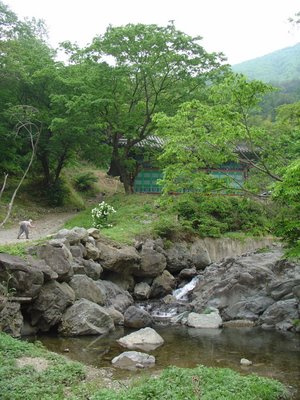 The thanks for a lifetime of farming is a ninety degree back.
The thanks for a lifetime of farming is a ninety degree back.  This one's right in the middle of downtown. Some guys getting drunk and yelling in mocking English, "Hey you! Drink, drink!" No thanks.
This one's right in the middle of downtown. Some guys getting drunk and yelling in mocking English, "Hey you! Drink, drink!" No thanks. 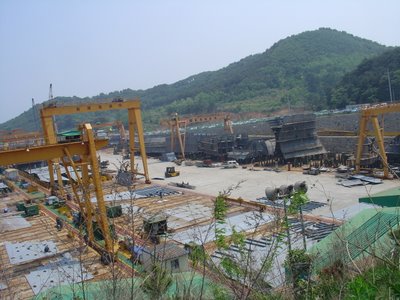 Shipyard. Park Chunghee agreed to Japanese reparations in the 60s, took the money, and built a town to produce steel and boats - Pohang. This isn't it, but it's nearby, and it looks like this. He made the country rich for sure, but on the backs of the workers. http://english.chosun.com/w21data/html/news/200509/200509070015.html
Shipyard. Park Chunghee agreed to Japanese reparations in the 60s, took the money, and built a town to produce steel and boats - Pohang. This isn't it, but it's nearby, and it looks like this. He made the country rich for sure, but on the backs of the workers. http://english.chosun.com/w21data/html/news/200509/200509070015.html My first sight of the ocean.
My first sight of the ocean. 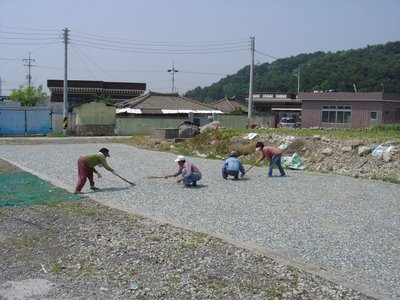 Fisher people drying little anchovies in the sun.
Fisher people drying little anchovies in the sun. 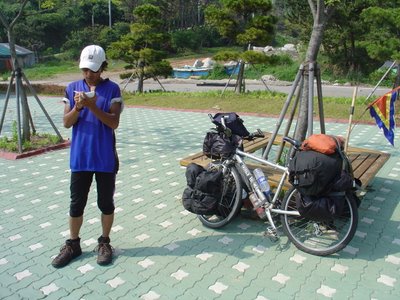 I met only two other people touring on bikes, a Germanish guy, and this Japanese guy. He looked exhausted after two weeks of roughing it. Even his flag looks tired. I'm sure he had a great time, even though Koreans can be really rude when they hear a Japanese accent.
I met only two other people touring on bikes, a Germanish guy, and this Japanese guy. He looked exhausted after two weeks of roughing it. Even his flag looks tired. I'm sure he had a great time, even though Koreans can be really rude when they hear a Japanese accent. 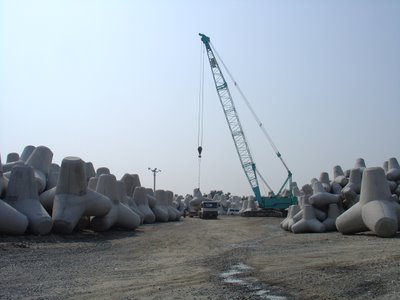 Big. There was no way to position myself to get the whole field of them in the frame.
Big. There was no way to position myself to get the whole field of them in the frame. 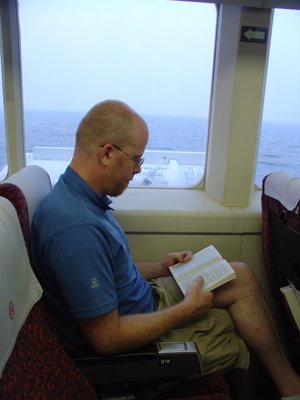 Shinhye met me again, and we took the ferry to Japan.
Shinhye met me again, and we took the ferry to Japan. 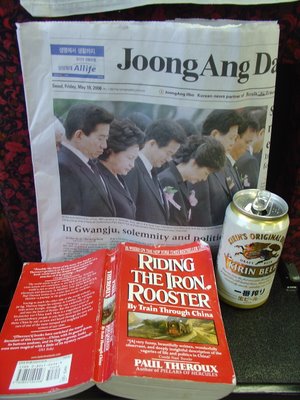 In 1980, there was a massacre of students by the military government in Gwangju, which people compare to Tianamen Square. More dramatic, if not as many as many deaths, and because of a press blackout and (at the very least) slow condemnation from the US, unheard of in the west. Like China today, no one really knew the details for a long time, although there were rumors. With the coming of democracy in 87, that changed, and now the massacre is observed every May 18th. Here are some of the leading politicians meeting in Gwangju. In the middle here, pretending to care, is the daughter of the dictator Park Chung-hee, and probable next President of Korea. During the ceremony, someone started an old student protest song. Mrs. Park, an apologist for her father's policies, was the only one who refused to sing along and, and instead reviewed her notes while all the other politicians sang. http://en.wikipedia.org/wiki/Gwangju_Massacre
In 1980, there was a massacre of students by the military government in Gwangju, which people compare to Tianamen Square. More dramatic, if not as many as many deaths, and because of a press blackout and (at the very least) slow condemnation from the US, unheard of in the west. Like China today, no one really knew the details for a long time, although there were rumors. With the coming of democracy in 87, that changed, and now the massacre is observed every May 18th. Here are some of the leading politicians meeting in Gwangju. In the middle here, pretending to care, is the daughter of the dictator Park Chung-hee, and probable next President of Korea. During the ceremony, someone started an old student protest song. Mrs. Park, an apologist for her father's policies, was the only one who refused to sing along and, and instead reviewed her notes while all the other politicians sang. http://en.wikipedia.org/wiki/Gwangju_Massacre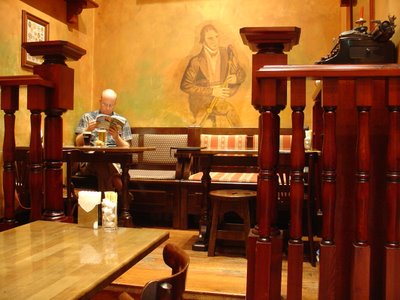 An empty Irish bar in Fukuoka.
An empty Irish bar in Fukuoka. 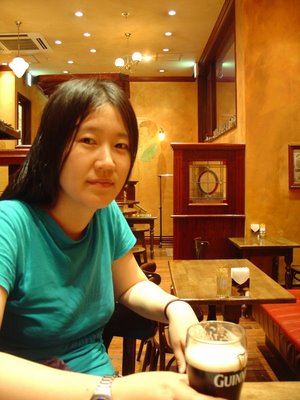 Real good beer.
Real good beer. 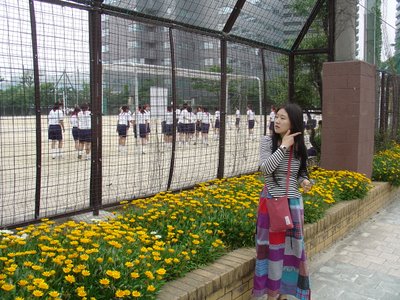 I wanted to watch the Japanese kids have PE class. Shinhye, who lived in Japan for seven years, was less interested.
I wanted to watch the Japanese kids have PE class. Shinhye, who lived in Japan for seven years, was less interested. 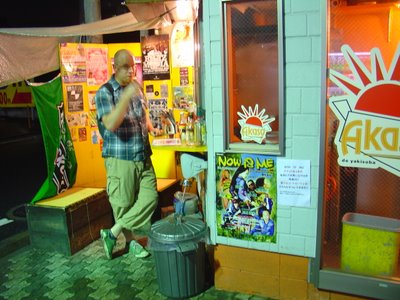 Walk up tequila bar. Get your shot at the window, drink it, and go. Efficient.
Walk up tequila bar. Get your shot at the window, drink it, and go. Efficient. 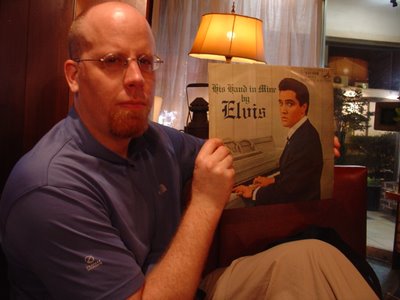 An old coffee shop whose owner hasn't changed the interior in forty years.
An old coffee shop whose owner hasn't changed the interior in forty years. 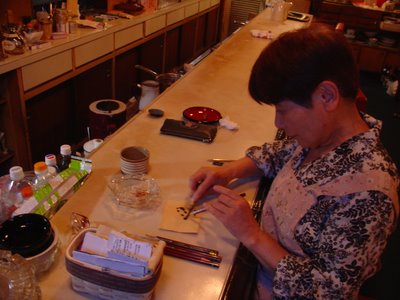 And who sharpens her pencils with a knife.
And who sharpens her pencils with a knife. 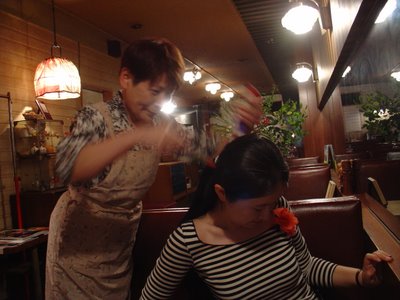 And who liked Shinhye so much she gave her a pretty ribbon.
And who liked Shinhye so much she gave her a pretty ribbon. 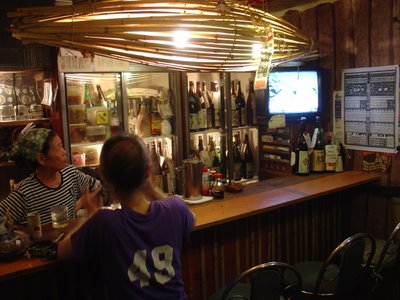 Bar.
Bar.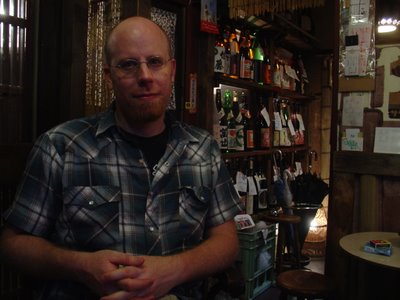 Bar. Like Korea, guests can leave their bottles of booze on the shelf if they don't finish, and drink it next time. Note the notes on each bottle.
Bar. Like Korea, guests can leave their bottles of booze on the shelf if they don't finish, and drink it next time. Note the notes on each bottle.  Stairs to a little upstairs room.
Stairs to a little upstairs room. 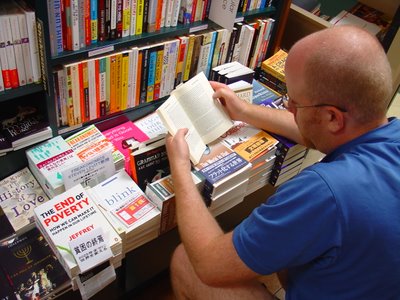 Korea's English bookstores are really bad. Japan's are good.
Korea's English bookstores are really bad. Japan's are good. 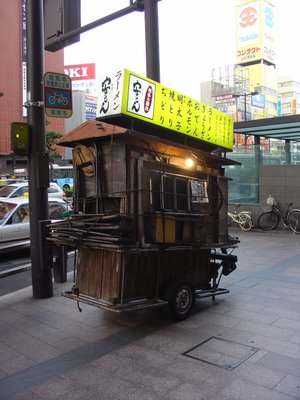 This becomes...
This becomes... 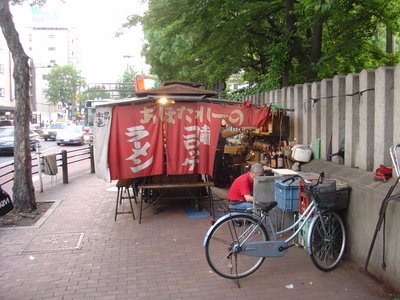 That. For eatin' and drinkin'.
That. For eatin' and drinkin'. 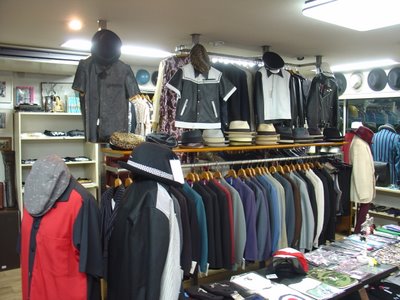 Mod shop.
Mod shop. 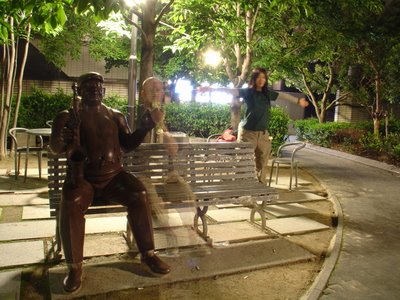
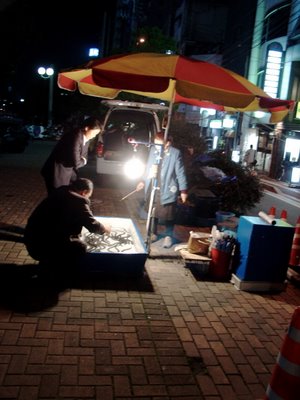 This is a sport for drunk salary men. Try to fish hook an eel!
This is a sport for drunk salary men. Try to fish hook an eel!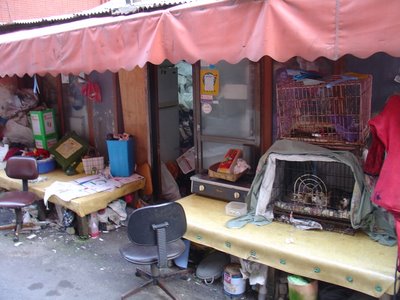 Back in Pusan, Korea, where I lived for six months in 1998. This was a filthy little convenience store by our house. Apparently it was so dirty no customers came, so they gave up and just live there with their kittens in cages.
Back in Pusan, Korea, where I lived for six months in 1998. This was a filthy little convenience store by our house. Apparently it was so dirty no customers came, so they gave up and just live there with their kittens in cages. 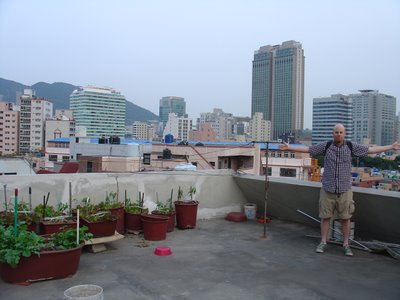 The roof of our apartment.
The roof of our apartment. 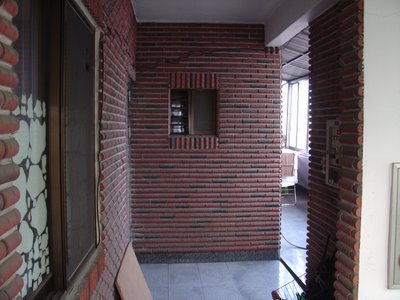 For Adam.
For Adam.
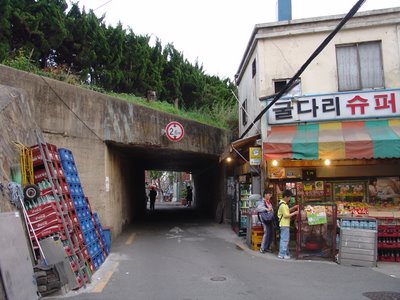 The bridge and the clean market...
The bridge and the clean market... 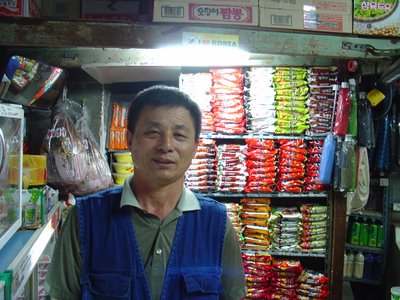 ...with the sweet owner who remembers you even after eight years.
...with the sweet owner who remembers you even after eight years.
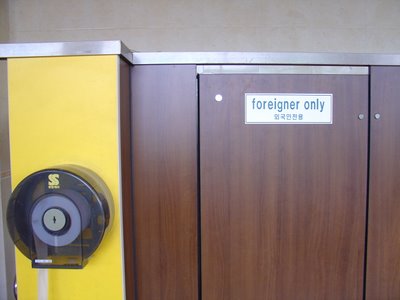 This is a sit, as opposed to squat, toliet.
This is a sit, as opposed to squat, toliet. 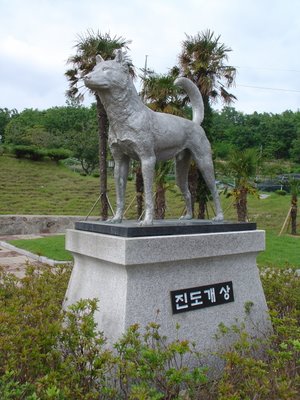 Jindo Island. I was especially excited to go here because of the unique breed of dogs that evolved or were breed on the island - the Jindo dog. They are really loyal (if you get one, they say, you should never give it away, because they are bred to only have one master. They are confused and miserable in new homes), territorial and smart. They're a numbered national treasure, and it's illegal to take them off the island, although people do.
Jindo Island. I was especially excited to go here because of the unique breed of dogs that evolved or were breed on the island - the Jindo dog. They are really loyal (if you get one, they say, you should never give it away, because they are bred to only have one master. They are confused and miserable in new homes), territorial and smart. They're a numbered national treasure, and it's illegal to take them off the island, although people do.  Jindo Research Center.
Jindo Research Center. 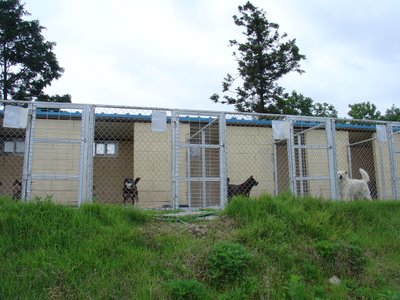 Dogs.
Dogs. 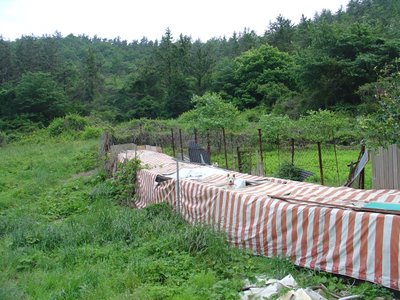 The sad part of the island was that the people on Jindo treat the dogs really badly. Here's a dubious breeding farm I found on a dirt road (see him poking his head out?).
The sad part of the island was that the people on Jindo treat the dogs really badly. Here's a dubious breeding farm I found on a dirt road (see him poking his head out?).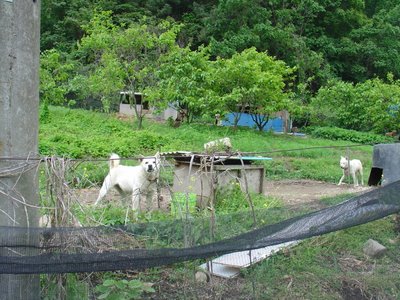 And all the dogs, like in Seoul, are on miserably short leashes.
And all the dogs, like in Seoul, are on miserably short leashes. 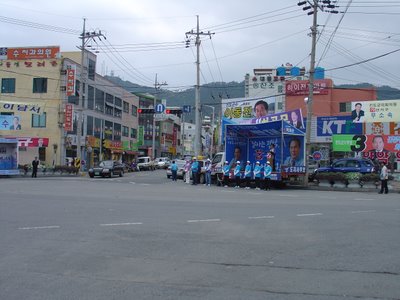 Election time in Korea. So you get your truck and your LOUDspeakers, a few soccer moms for volunteers, and give a speech to a deserted intersection. Every town it was the same for a week (there's a limited official campaign period). The best though is when they play the candidate theme song and the soccer moms dance and sing along to the empty intersection.
Election time in Korea. So you get your truck and your LOUDspeakers, a few soccer moms for volunteers, and give a speech to a deserted intersection. Every town it was the same for a week (there's a limited official campaign period). The best though is when they play the candidate theme song and the soccer moms dance and sing along to the empty intersection.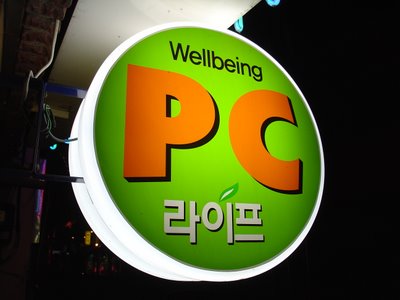 The "wellbeing" craze in Korea started with the usual - health food, natural soaps - and now includes well-being soju and smoky, damp, dark internet cafes.
The "wellbeing" craze in Korea started with the usual - health food, natural soaps - and now includes well-being soju and smoky, damp, dark internet cafes.  Dancing in the rain.
Dancing in the rain.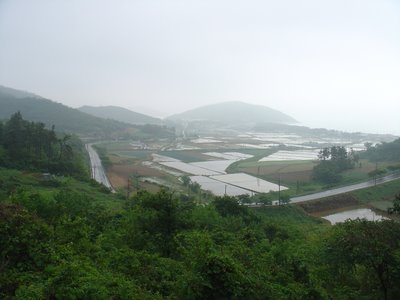 Riding up the steepest hill of the trip, in the rain. When I asked directions at a store, they laughed at me and said "no way can you ride up that mountain". Half way up I was cursing myself for not listening.
Riding up the steepest hill of the trip, in the rain. When I asked directions at a store, they laughed at me and said "no way can you ride up that mountain". Half way up I was cursing myself for not listening. 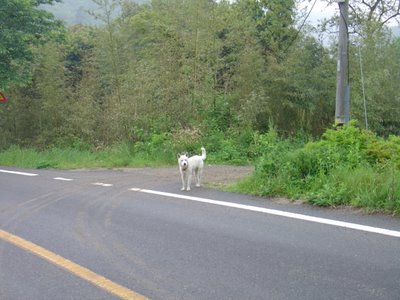 The only Jindo dog that wasn't on a leash.
The only Jindo dog that wasn't on a leash. 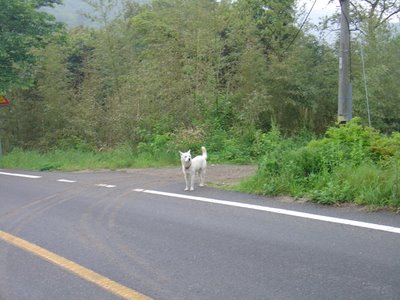 That was his border, he ran up the road to me, and stopped there.
That was his border, he ran up the road to me, and stopped there. 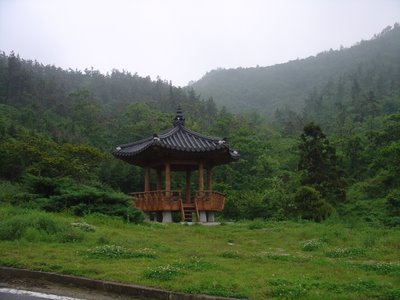 Just some pagoda by the side of the road. Stop and read your book and have a beer because it's on the back side of the mountain and by God you earned it.
Just some pagoda by the side of the road. Stop and read your book and have a beer because it's on the back side of the mountain and by God you earned it.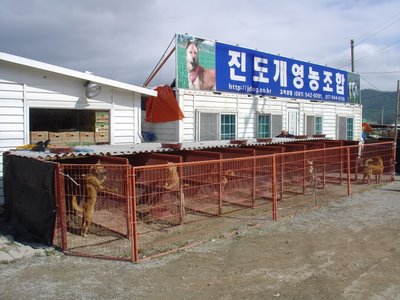 An official breeder.
An official breeder. 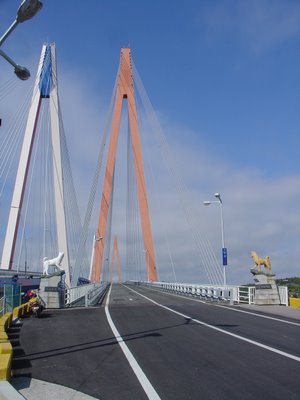 The famous and ugly Jindo bridge. Notice the statues of dogs that guard Jindo.
The famous and ugly Jindo bridge. Notice the statues of dogs that guard Jindo.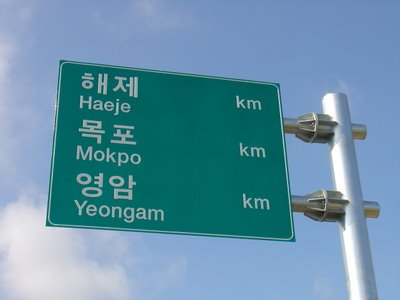 It was not no kilometers, but like 50.
It was not no kilometers, but like 50. The single worst thing about the trip: trash everywhere. I read somewhere that Koreans are super nationalistic, but they don't seem to love their country. Not true of course, but it's one way to think about it.
The single worst thing about the trip: trash everywhere. I read somewhere that Koreans are super nationalistic, but they don't seem to love their country. Not true of course, but it's one way to think about it.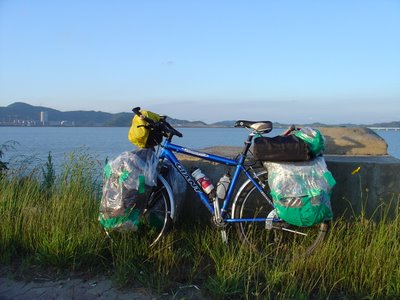 My homemade rain covers.
My homemade rain covers.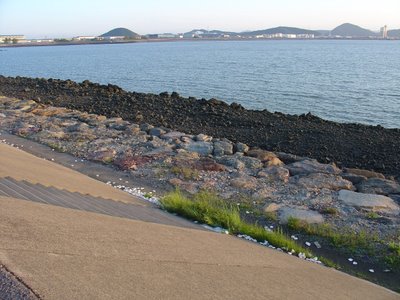 Those are all white vending machine coffee cups. This small dam was a mile long, and the length of it was covered in coffee cups. I never found the machine.
Those are all white vending machine coffee cups. This small dam was a mile long, and the length of it was covered in coffee cups. I never found the machine. 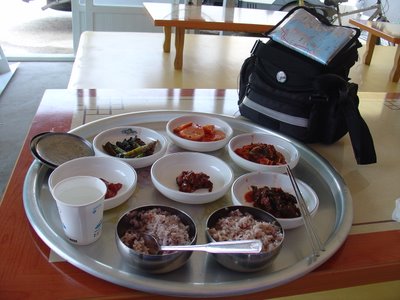 As the trip went on, I started running out of money. So I would go into a restaurant in my most dejected face and say "Can I buy just a bowl of rice?" Every meal in Korea comes with side dishes of vegetables and other little things, so I counted on the owners' generosity. They never let me down, and often I didn't have to pay. I was taking pictures of every meal at this point.
As the trip went on, I started running out of money. So I would go into a restaurant in my most dejected face and say "Can I buy just a bowl of rice?" Every meal in Korea comes with side dishes of vegetables and other little things, so I counted on the owners' generosity. They never let me down, and often I didn't have to pay. I was taking pictures of every meal at this point. 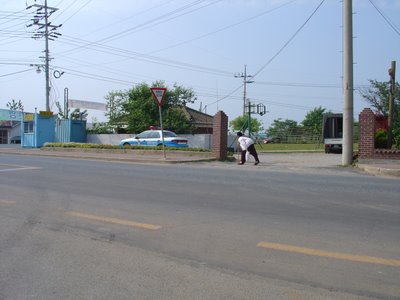 Again, a lifetime of farming.
Again, a lifetime of farming.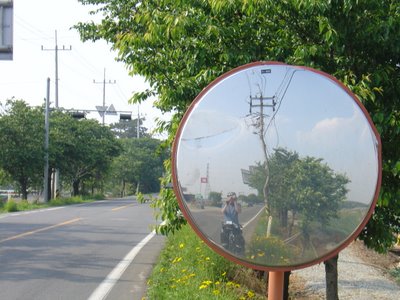 I realized this is the only picture of me on my bike. Look, Mom, helmet!
I realized this is the only picture of me on my bike. Look, Mom, helmet!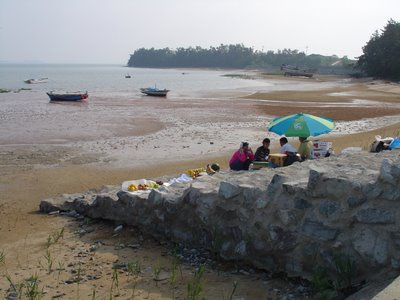 A family doing prayers to a dead ancestor. All the fruit and vegetables and the pig's head are laid out as an offering. They were friendly, but didn't want me to take pictures, so I had to shoot this one quietly, so no pig's head.
A family doing prayers to a dead ancestor. All the fruit and vegetables and the pig's head are laid out as an offering. They were friendly, but didn't want me to take pictures, so I had to shoot this one quietly, so no pig's head. 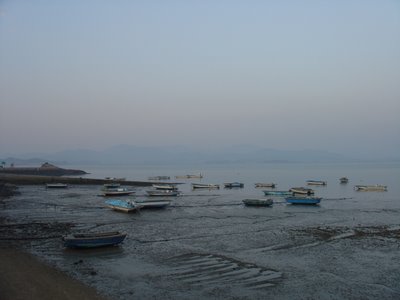 Boats.
Boats. 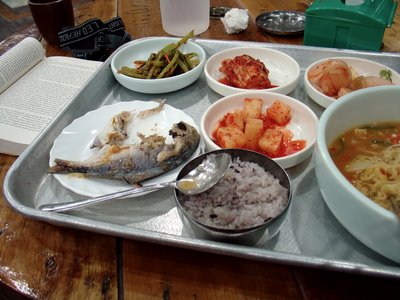 The ramen here cost two bucks, and they gave me free rice and a fish the owner said was caught that day. I ate dinner and breakfast here.
The ramen here cost two bucks, and they gave me free rice and a fish the owner said was caught that day. I ate dinner and breakfast here. 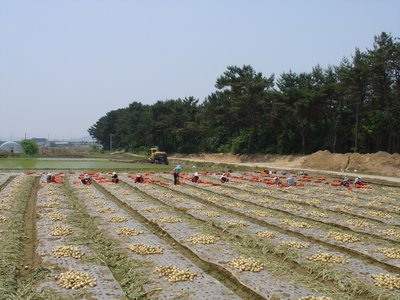 In little villages, the old women come together at various times of the year to pool their back-breaking skills. I never figured out where the men are. Not working in the fields anyway. Who needs 'em.
In little villages, the old women come together at various times of the year to pool their back-breaking skills. I never figured out where the men are. Not working in the fields anyway. Who needs 'em. 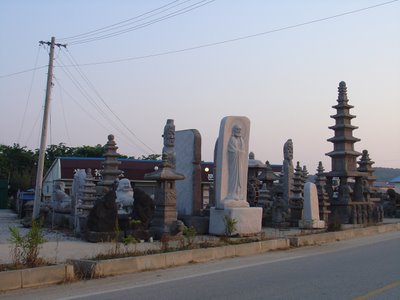 Tombstones for sale.
Tombstones for sale. 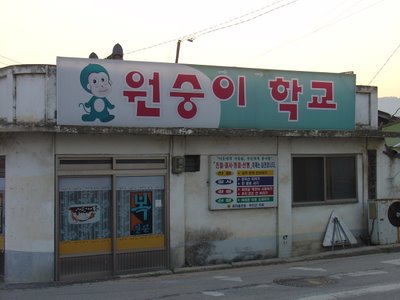 That says "Monkey School," which is probably what the teacher thinks of his students. It's a normal after-school tutoring institute, almost every kid goes to three or four.
That says "Monkey School," which is probably what the teacher thinks of his students. It's a normal after-school tutoring institute, almost every kid goes to three or four. 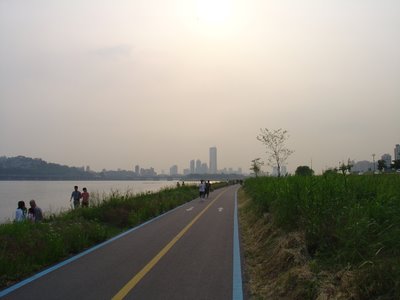 Back in Seoul, along the river.
Back in Seoul, along the river.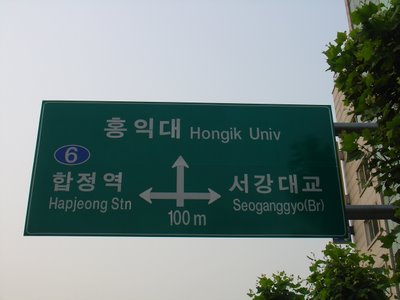 Home is 100 meters.
Home is 100 meters.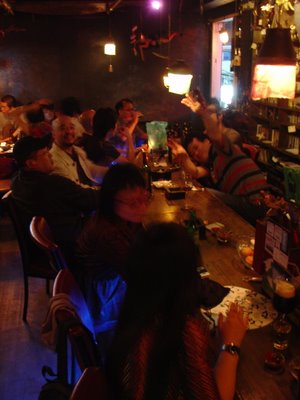 Full circle, and nobody seems to have moved at all.
Full circle, and nobody seems to have moved at all.